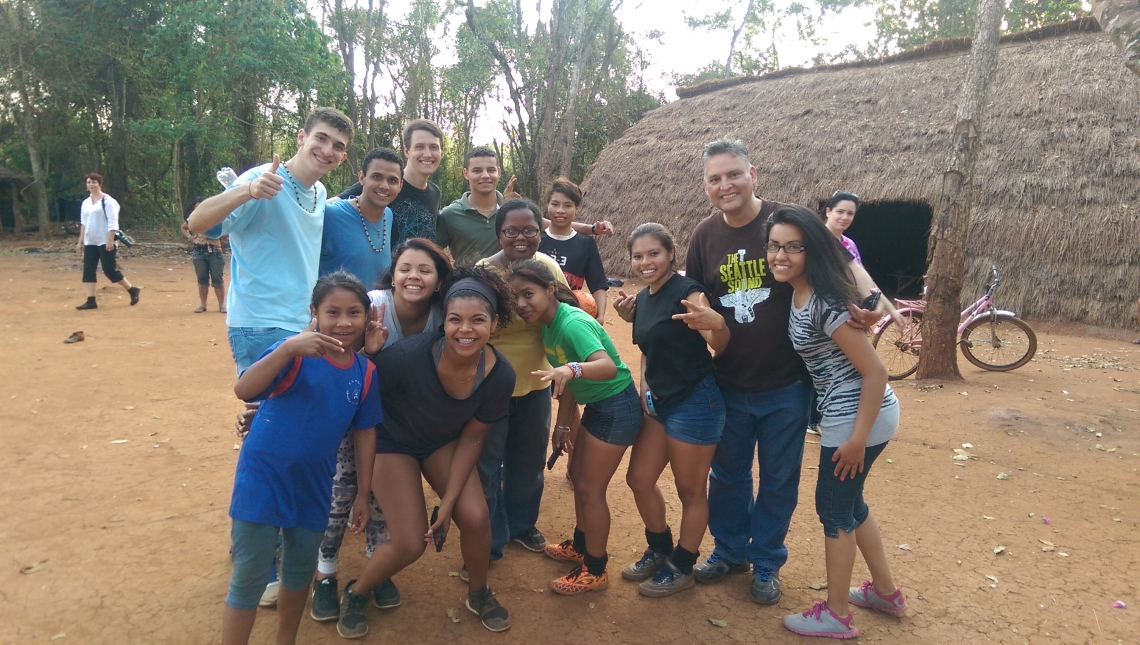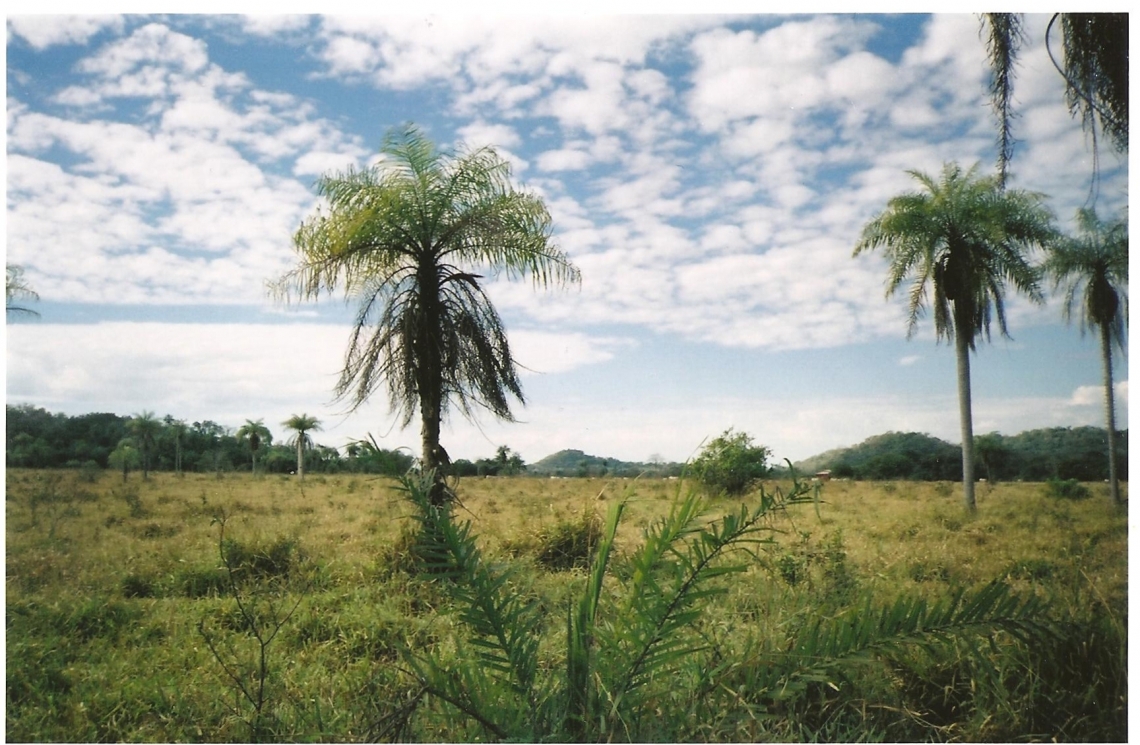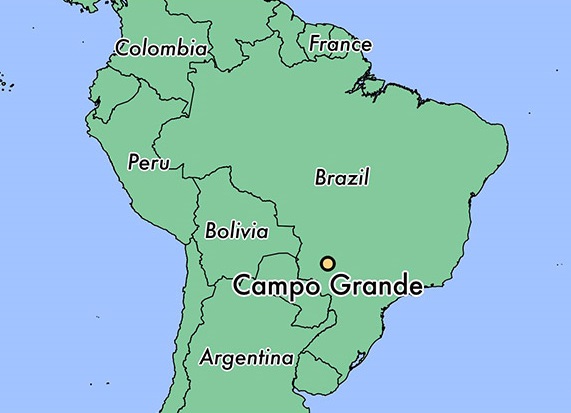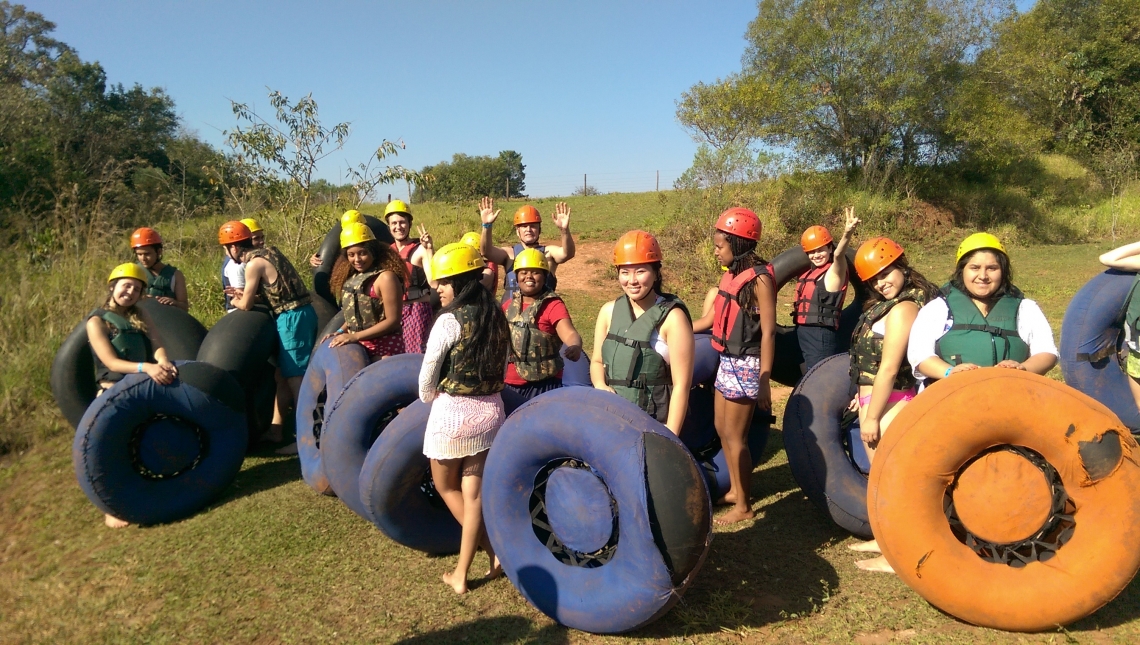Main Content
DEADLINE EXTENDED: Apply by April 12, 2019
| Term | Year | Application Deadline | Start Date | End Date | Dates Abroad | Location(s) | Budget |
|---|---|---|---|---|---|---|---|
| Summer B | 2019 | February 15, 2019 | July 29, 2019 | August 30, 2019 | August 11 - 24, 2019 | Campo Grande, Brazil |
|

This hybrid program offers a unique opportunity to study at UW Tacoma and in Brazil over a five-week period. Students will engage in experiential learning projects with Brazilian students and visit indigenous and African-descendant communities to develop a critical understanding of human rights claims and the intersections of race, gender, class, ethnicity, and sexuality in contemporary Brazil.
This program will be a hybrid model with two weeks of classes at UW Tacoma (July 29-August 9), followed by two weeks in Brazil (August 11-24) and one week of class again at UW Tacoma (Aug 26-30). During the two weeks before their departure, students will learn an overview of Brazilian history, rudiments of the Portuguese language, current events in Brazil, differing social movements, and key themes of the philosophy of human rights. In Brazil, students will take part in workshops and conduct collective projects with Brazilian students and faculty from the Federal University of Mato Grosso do Sul and the Dom Bosco Catholic University before returning to UW Tacoma for final reflections and assignments.
This study abroad program is led by Margaret Griesse and Amos Nascimento.
Academic Content
This program does not require any prerequities or language requirements. Students will earn 12 credits for this study abroad program for the following two courses:
TEGL 498 or TGH 399 (7 credits) – Study Abroad: Intersections
TEGL 498 explores intersectionality of differing social categories such as race, gender, ethnicity, class, religion, sexuality and so on in Brazil to enhance understanding of global-local dynamics. This course includes on-site interactions/collaborations with local organizations, scholars, activists and students, visits to cultural venues, and participation in community experiences.
Credit for TGH 399 will be available for students in UW Tacoma's Global Honors program.
Learning Goals Include:
- Describe the theoretical application of the intersectional approach
- Recognize and critically analyze historical, social, cultural, economic and political factors that give rise to social identities, categories and divisions within Brazil.
- Analyze the ways in which ethnicity, race, gender, sexuality and class intersect within the current regional context(s).
- Analyze the representation of different social categories and identities within the region of Campo Grande
- Engage with scholars, activists and residents concerning social categories and possibilities for change.
- Discuss how global divisions and representations cross borders
TPHIL 200 (5 credits) – Introduction to the Philosophy of Human Rights
This course provides an Introduction to the Philosophy of Human Rights with a specific focus on Brazil. Considers historical developments from colonialism to postcolonial processes, race relations involving the Afro-Brazilian struggles for freedom, citizenship, and human rights, and philosophical considerations on environmental rights, especially as they relate to the rights of indigenous peoples. Provides an overview of basic concepts and discussions in these areas, relating them to selected philosophical thinkers and discusses how they have a concrete impact on contemporary initiatives on human rights in the Brazilian context.
Learning Goals Include:
- Understand key themes in recent debates on the philosophy of human rights
- Learn about the work of philosophers and activists on human rights in Brazil
- Establish a direct dialogue with people involved in initiatives to address the problems of coloniality, racism, self-determination, and environmental degradation.
- Read key texts connecting human rights and environmental rights and connect them to real issues
- Evaluate philosophical discussion in Brazil and develop your own position on human rights issues.

Program Schedule
The program runs from July 29 - August 30, 2019. The program will begin with two weeks of classes at UW Tacoma (July 29-Aug 09) followed by two weeks in Brazil (Aug 11-24) and one week of class again at UW Tacoma (Aug 26-30).
Housing
Students will stay in a youth hostel, Hostel Inn Campo Grande, within walking distance of the Federal University of Mato Grosso do Sul. Hostel Inn Campo Grande offers breakfast, has wifi, and is located within a concrete walled compound.
Field Trips
There will be three day trips to an eco-tourism ranch, Quilombo (rural African-Brazilian community), and another urban indigenous community. Students will learn about struggles and strategies within these areas and intersections of land/territory/ethnicity/race/gender/capitalism. Students will also visit a museum, women's center, city fair and other organizations within the city of Campo Grande. All costs associated with this these field trips (transportation, accommodation and meals) are included in the program fee.
Student Eligibility
Students studying philosophy, political science, ethnic, gender and labor studies, environmental studies may be particularly interested in this program. However, we welcome undergraduate students of all majors. Graduate and non-matriculated students are also welcome to apply. There are no prerequisites or language requirements.
Application Deadline
Applications are due on January 31, 2019. Applicants will be notified of acceptance decisions February 12. Once accepted to the program, applicants will need to confirm their participation in the program by February 26, 2019. Click the "Apply Now" button below to begin.
Travel Documents and Insurance
Passport and Visas
A passport and visa are required for entry into Brazil. You must obtain your Brazilian visa in advance from the Brazilian Embassy or consulate nearest to your place of residence in the United States. Once you are accepted into the program, the program director will walk you through this process.
Note: If you are not a U.S. citizen, consult the Brazilian Consulate in San Francisco to learn their document requirements. You can also email uwtintl@uw.edu.
Insurance
The University of Washington requires students engaged in educational activities abroad – including study, research, internships or community engagement – to purchase UW Student Abroad Insurance. If you are a current UW student, you are required to purchase coverage UW Student Abroad Insurance. Details are on the UW Study Abroad Insurance page.

Program Cost
The program fee is $3,050.
Included in the cost of the program:
- $450 Administrative Fee
- Instruction
- Housing
- Program activities and program travel
Not Included in program fees:
- Airfare to/from Brazil
- Transportation to and from airport
- UW Student Abroad Insurance
- Visa costs
- Personal expenses (phone calls, eating out, etc.).
- Textbooks
Payment Due Date: July 12, 2019
Program fees will be posted to your MyUW student account and can be paid the same way that you pay tuition and other fees. Check your MyUW Account periodically for due dates.
Withdrawals
The $450 UW Study Abroad Fees are non-refundable once a contract has been submitted. Students withdrawing from a program are responsible for paying a percentage of the program fee depending on the date of withdrawal. More details about the withdrawal policy are included in your payment contract. No part of the program fee is refundable once the program has begun. The date of withdrawal is considered the business day a withdrawal form is received by the Office of Global Affairs. Notice of withdrawal from the program must be made in writing by completing the following steps:
- Provide notice in writing to the program director that you will no longer be participating in the program.
- Submit a signed withdrawal form to the Office of Global Affairs.
Financial Aid and Scholarships
- A large percentage of UW students utilize financial aid to study abroad. Most types of financial aid can be applied to study abroad fees.
- For UW Tacoma students, you can submit a revision request to increase the amount of aid for the quarter you are studying abroad. These additional funds are usually awarded in the form of loans. To apply, fill out a revision request form, attach the budget sheet (available via the link at the top of this brochure) and submit these documents to the UW Tacoma Office of Financial Aid.
- For UW Seattle or Bothell Students, you can apply by filling out a revision request form, attach the budget sheet (available via the link at the top of this brochure) and submit these documents to the Office of Financial Aid.
- Consult the Financial Aid section of our website for more information on applying for financial aid, special considerations for summer and early fall programs, and budgeting and fundraising tips
- Please also review this list of scholarships: these are opportunities that can help fund your study abroad experience. Please note that many of them have deadlines before your study abroad application is due. For help with the application process, please contact uwtintl@uw.edu.

Budgeting Tools
We understand that figuring out your finances for study abroad can be complicated, and we are here to help. Here are some ways to find additional support:
- Click on the Budget Sheets link at the top of this brochure to view the estimated budget of all expenses for this program.
- UW Tacoma students can attend a How to Fund Your Study Abroad event - more information is on the Events page of our website.
Orientation
To be eligible to study abroad, all program participants must attend an online pre-departure orientation facilitated by the Office of Global Affairs/UW Study Abroad as well as your program-specific orientations, offered by your program directors. Orientation must be completed prior to the enrollment deadline for the quarter that you are studying abroad.
Changes in Cost or Scope of Program
In the event of significant devaluations of the dollar, some adjustments to program activities may be necessary. If there are any political events that might compromise the safety of the participants, a rescheduling or cancellation of the program may be necessary. If such changes occur, students will be notified of the changes and options will be presented.
Program Cancellation
If viable enrollment is not reached by April 1, 2019 the program will be cancelled. Participants will be notified and the administrative and program fees will be refunded.
Disability Accommodations
The University of Washington is committed to providing access and reasonable accommodation in its services, programs, activities, and education for individuals with disabilities. To request disability accommodation for this program, contact Disability Resources for Students at least 8 weeks in advance of your departure date. Contact info at tacoma.uw.edu/drsuwt.
